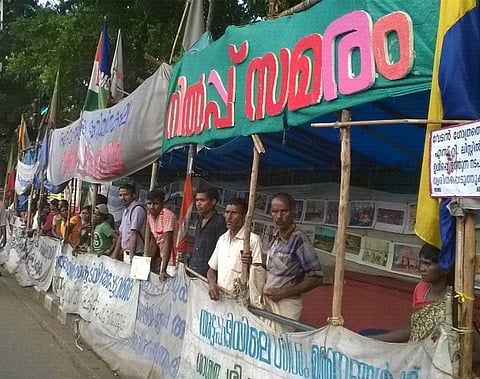

Vivek Narayanan
The Adivasi Gothra Mahasabha (AGMS) representing the Adivasis of Kerala has been on strike in front of the state secretariat for over 150 days, demanding that the government return their once inhabited land.
Their method of protest has been to stand round the clock. They have already garnered support from people and left wing organizations, but are still at the mercy of the state and central government.
‘Nilpu samaram’, also known as standing up without resting your body, is a mode of strike they have adopted - a peaceful protest to remind the authorities, about the rights they were denied on the land they have been inhabiting for centuries. More than hundred families are battling the cold wind and rain inside the dilapidated tents – a majority of whom are women and children from the worst affected villages of Attappadi, a tribal colony in Palakkad, from the hinterlands of Wayanad district and from Idukki district. They have been standing since July 9.
C.K Janu, president of AGMS, the organization helming the group for the last three decades, says that they will continue the strike until the last adivasi in the state is provided with land which is promised by the state governments who have now shunned them to support the land mafia and contractors who have vested interest in real estate and quarry mining in the hilly regions. The struggle, which dates back to the post independent days, reflects the atrocious situation of the people who lived in the hinterlands and the autocratic mindset of the state, which witnessed some of the historic revolutionary land struggles the country has witnessed post-independence.
Demand for forest rights and return of land
The AGMS argues that Article-244 and sections 5 and 6 of the constitution, which protects the rights of the tribal people, have not been implemented in Kerala ever since the independence. It also said that the state and its authorities has always tried to rehabilitate them to ‘furnished’ and ‘better’ colonies in the name of development, and there by uprooting them from their homeland where they have been a part for centuries. “There are 25,000 acres of land in Kerala which is yet to be distributed to the tribal community as per the Kerala Scheduled tribes act, 1975. Both the Left, as well as the United Democratic front has diluted the clauses of the laws by amending it at regular intervals”, said C.K Janu.
People from various sections of society have already been pledged support for the past four months to the strike. The standing-up strike by the adivasi community which commenced on July 9 has already witnessed support and solidarity from celebrities, NGO's and most notably from various student groups and new generation clubs and associations such as TISS, Mumbai, Arts and Science colleges in Kerala. Even though celebrity supporters and small groups join the strike expressing solidarity attracting a few media camera's and playing drums along with the children in the venue, many believe that the strike requires leverage and political support at a higher level, else the agitation will fade away from the eyes of the media and public.
Their demands